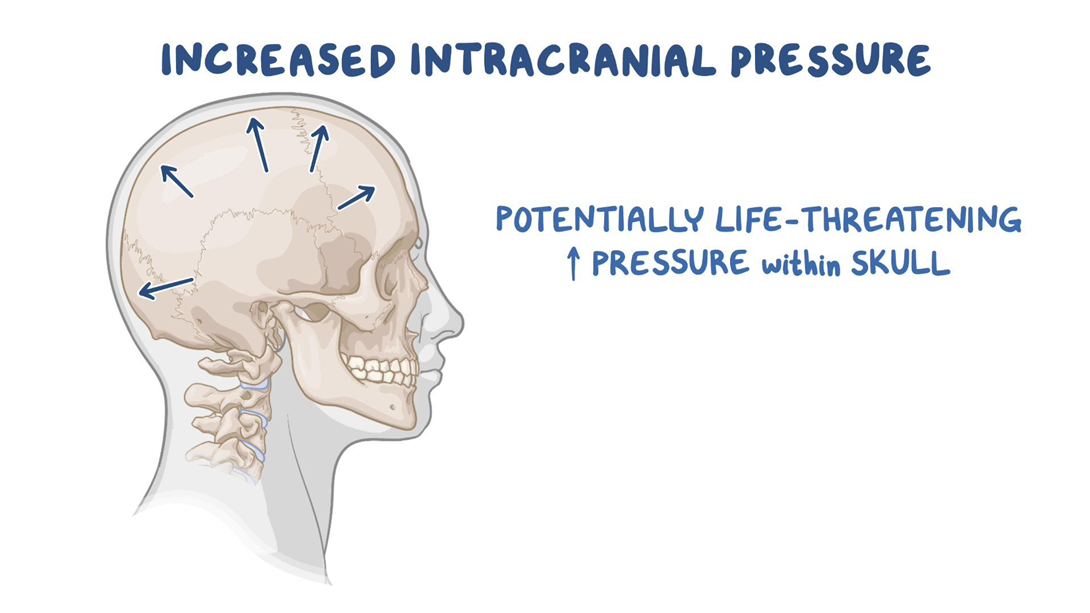A patient is admitted to the hospital with symptoms consistent with a right hemisphere stroke. Which neurovascular assessment requires immediate intervention by the nurse?
Pupillary changes to ipsilateral dilation.
Left-sided facial drooping and dysphagia.
Orientation to person and place only.
Unequal bilateral hand grip strengths.
The Correct Answer is A
Choice A reason: Pupillary changes to ipsilateral dilation indicate increased intracranial pressure, which is a life-threatening complication of stroke. The nurse should notify the physician and prepare for emergency measures.

Choice B reason: Left-sided facial drooping and dysphagia are common signs of right hemisphere stroke, but they do not require immediate intervention by the nurse. The nurse should monitor the patient's swallowing ability and provide oral care.
Choice C reason: Orientation to person and place only is a sign of impaired cognition, which is also common in right hemisphere stroke. The nurse should assess the patient's memory, judgment, and attention span.
Choice D reason: Unequal bilateral hand grip strengths are a sign of hemiparesis, which is a weakness on one side of the body. The nurse should assist the patient with mobility and prevent contractures.
Nursing Test Bank
Naxlex Comprehensive Predictor Exams
Related Questions
Correct Answer is C
Explanation
Choice A reason: Restriction of caloric intake is not a good change for a client with diabetes mellitus and an upper respiratory infection, because it can lead to hypoglycemia and malnutrition. The client needs adequate calories to maintain blood glucose levels and support immune function. Therefore, this choice is incorrect.
Choice B reason: Fewer fingerstick glucose checks are not a good change for a client with diabetes mellitus and an upper respiratory infection, because they can lead to poor blood glucose control and complications. The client needs frequent monitoring of blood glucose levels to adjust insulin doses and prevent hyperglycemia or hypoglycemia. Therefore, this choice is incorrect.
Choice C reason: Higher doses of insulin are a good change for a client with diabetes mellitus and an upper respiratory infection, because they can help lower blood glucose levels and prevent ketoacidosis. The client needs more insulin to overcome the increased insulin resistance caused by the infection and the stress hormones. Therefore, this choice is correct.
Choice D reason: Increased oral fluid intake is a good change for a client with diabetes mellitus and an upper respiratory infection, but it is not directly related to blood glucose management. The client needs more fluids to prevent dehydration and clear mucus from the respiratory tract. Therefore, this choice is not the best answer.
Correct Answer is B
Explanation
Choice A reason: The humoral immune response is mediated by B cells that produce antibodies against specific antigens. However, this response is not the main problem in AIDS, because B cells are not directly affected by the human immunodeficiency virus (HIV) that causes AIDS. Therefore, this choice is incorrect.
Choice B reason: The cellular immune response is mediated by T lymphocytes that activate other immune cells, such as macrophages, to destroy infected or abnormal cells. This response is the main problem in AIDS, because HIV infects and destroys CD4+ T cells, which are essential for coordinating the cellular immunity. As a result, the client becomes susceptible to opportunistic infections, such as Pneumocystis jiroveci pneumonia. Therefore, this choice is correct.
Choice C reason: Bone marrow suppression of white blood cells can cause immunodeficiency, but it is not the primary cause of AIDS. Bone marrow suppression can occur as a side effect of some drugs or treatments, such as chemotherapy or radiation therapy, but it is not directly caused by HIV. Therefore, this choice is incorrect.
Choice D reason: Exposure to multiple environmental infectious agents can challenge the immune system, but it does not necessarily cause it to fail. The immune system can adapt and respond to different pathogens, unless it is compromised by an underlying condition, such as AIDS. Therefore, this choice is incorrect.
Whether you are a student looking to ace your exams or a practicing nurse seeking to enhance your expertise , our nursing education contents will empower you with the confidence and competence to make a difference in the lives of patients and become a respected leader in the healthcare field.
Visit Naxlex, invest in your future and unlock endless possibilities with our unparalleled nursing education contents today
Report Wrong Answer on the Current Question
Do you disagree with the answer? If yes, what is your expected answer? Explain.
Kindly be descriptive with the issue you are facing.
